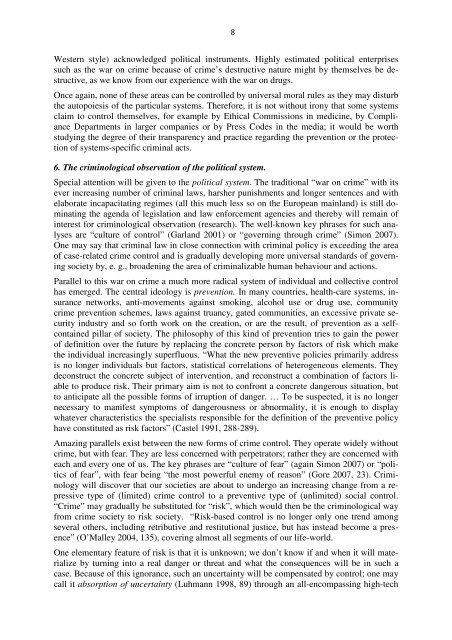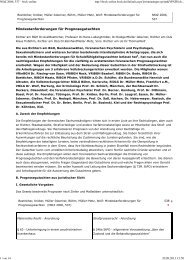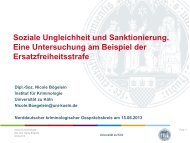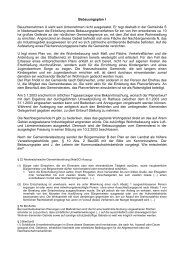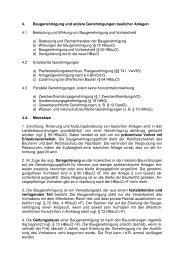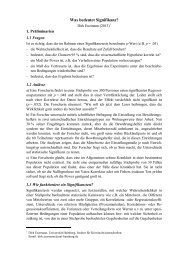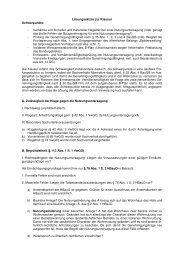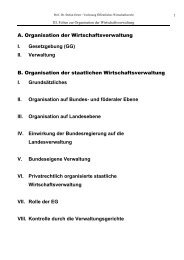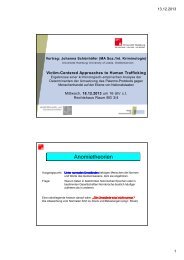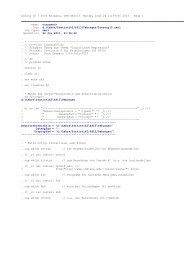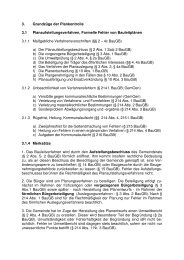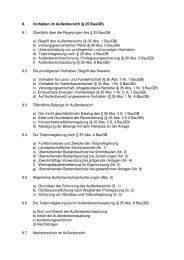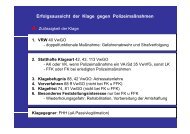Sessar Porto Problems criminology has with criminal law
Sessar Porto Problems criminology has with criminal law
Sessar Porto Problems criminology has with criminal law
You also want an ePaper? Increase the reach of your titles
YUMPU automatically turns print PDFs into web optimized ePapers that Google loves.
8<br />
Western style) acknowledged political instruments. Highly estimated political enterprises<br />
such as the war on crime because of crime’s destructive nature might by themselves be destructive,<br />
as we know from our experience <strong>with</strong> the war on drugs.<br />
Once again, none of these areas can be controlled by universal moral rules as they may disturb<br />
the autopoiesis of the particular systems. Therefore, it is not <strong>with</strong>out irony that some systems<br />
claim to control themselves, for example by Ethical Commissions in medicine, by Compliance<br />
Departments in larger companies or by Press Codes in the media; it would be worth<br />
studying the degree of their transparency and practice regarding the prevention or the protection<br />
of systems-specific <strong>criminal</strong> acts.<br />
6. The criminological observation of the political system.<br />
Special attention will be given to the political system. The traditional “war on crime” <strong>with</strong> its<br />
ever increasing number of <strong>criminal</strong> <strong>law</strong>s, harsher punishments and longer sentences and <strong>with</strong><br />
elaborate incapacitating regimes (all this much less so on the European mainland) is still dominating<br />
the agenda of legislation and <strong>law</strong> enforcement agencies and thereby will remain of<br />
interest for criminological observation (research). The well-known key phrases for such analyses<br />
are “culture of control” (Garland 2001) or “governing through crime” (Simon 2007).<br />
One may say that <strong>criminal</strong> <strong>law</strong> in close connection <strong>with</strong> <strong>criminal</strong> policy is exceeding the area<br />
of case-related crime control and is gradually developing more universal standards of governing<br />
society by, e. g., broadening the area of <strong>criminal</strong>izable human behaviour and actions.<br />
Parallel to this war on crime a much more radical system of individual and collective control<br />
<strong>has</strong> emerged. The central ideology is prevention. In many countries, health-care systems, insurance<br />
networks, anti-movements against smoking, alcohol use or drug use, community<br />
crime prevention schemes, <strong>law</strong>s against truancy, gated communities, an excessive private security<br />
industry and so forth work on the creation, or are the result, of prevention as a selfcontained<br />
pillar of society. The philosophy of this kind of prevention tries to gain the power<br />
of definition over the future by replacing the concrete person by factors of risk which make<br />
the individual increasingly superfluous. “What the new preventive policies primarily address<br />
is no longer individuals but factors, statistical correlations of heterogeneous elements. They<br />
deconstruct the concrete subject of intervention, and reconstruct a combination of factors liable<br />
to produce risk. Their primary aim is not to confront a concrete dangerous situation, but<br />
to anticipate all the possible forms of irruption of danger. … To be suspected, it is no longer<br />
necessary to manifest symptoms of dangerousness or abnormality, it is enough to display<br />
whatever characteristics the specialists responsible for the definition of the preventive policy<br />
have constituted as risk factors” (Castel 1991, 288-289).<br />
Amazing parallels exist between the new forms of crime control. They operate widely <strong>with</strong>out<br />
crime, but <strong>with</strong> fear. They are less concerned <strong>with</strong> perpetrators; rather they are concerned <strong>with</strong><br />
each and every one of us. The key phrases are “culture of fear” (again Simon 2007) or “politics<br />
of fear”, <strong>with</strong> fear being “the most powerful enemy of reason” (Gore 2007, 23). Criminology<br />
will discover that our societies are about to undergo an increasing change from a repressive<br />
type of (limited) crime control to a preventive type of (unlimited) social control.<br />
“Crime” may gradually be substituted for “risk”, which would then be the criminological way<br />
from crime society to risk society. “Risk-based control is no longer only one trend among<br />
several others, including retributive and restitutional justice, but <strong>has</strong> instead become a presence”<br />
(O’Malley 2004, 135), covering almost all segments of our life-world.<br />
One elementary feature of risk is that it is unknown; we don’t know if and when it will materialize<br />
by turning into a real danger or threat and what the consequences will be in such a<br />
case. Because of this ignorance, such an uncertainty will be compensated by control; one may<br />
call it absorption of uncertainty (Luhmann 1998, 89) through an all-encompassing high-tech


